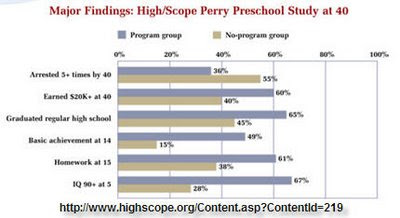The second goal was to fight poverty by giving students the necessary skills and by helping their parents by connecting them to the available community resources that would help parents gain employment.
Now some would argue that programs like Head Start and Early Head Start are programs that throw money down the drain. That these types of programs are “nice” in theory but there is little or no return on investment. The money could be better spent.
Not so fast, this is not a political piece of pork barrel whimsy. There was a long term study done of the first students who attended the program and a control group of those children that did not attend a Head Start program. The High/Scope Perry Preschool Study Through Age 40, shows the effects and benefits of providing early education and parental support.

So when these children and the family become involved in a Head Start or Pre-Kindergarten (Pre-K) program the long term effects seems to be less crime, increased income, better ongoing school participation and you get a smarter kid by the time she or he gets to Kindergarten.
And those that did not attended? Not so good and the cost of continuous incarceration is much more than the cost of educating a small child, which in FY 2008 was $7,326. Additional studies and evidence have proven this is a wise, sane investment for the entire country whether you have children or not. There is a downloadable summary of the report that goes into detail on findings of the study.
Everybody Wins Right?
Well, no. There has been increased funding for the program but only half of the eligible students gets to go to Head Start. And if your income exceed your local poverty level your kid doesn’t have access to the services of Head Start or Early Head Start. So the truth is half of the intended population does not get access to Head Start. Working poor and middle class families that could also use the help are not eligible or cannot afford the co-payments to the non -educational components of Head Start and Early Head Start.
Homeschool Options
Over at Contented Baby is one mom’s chronicles of searching for the right books, tools and skills to help educate her daughter. Stay At Home Mommy has a bit of frustration at finding home schooling toddler lessons and plans. Joanna at Is That So offers tips on home schooling at two year old.
Faith Based Pre-K Option
What if you as a parent want your toddler to educated but to be introduced to the tenets of your faith? There are faith based Pre-K programs. One that make good use of blogging is the Noah’s Ark Early Childhood Education Program in Lake Oswego, Oregon. Parents can get day photos and updates on what the children and staff are learning in the classroom.
Montessori Pre-K and Early Childhood Education
This is a 10 minute video that show the Montessori teaching system as applied to infant and toddler education. It is an experiential as opposed to a structured approach.
To be honest, I did not know about this approach to education so I sought out information at the American Montessori Society's FAQ page. Any educational philosophy that starts out with "The aim of Montessori education is to foster competent, responsible, adaptive citizens who are lifelong learners and problem solvers." is alright with me. Susana at Montessori Candy and Montessori Mama are two mom bloggers who support this method of instruction.
Whose Got The Money?
Yes. It does come down to the dollars. I doubt that there will be an increase in the federal budget that would allow for full funding of the Head Start and Early Head Start programs. There may need to be more public/private partnerships but those are going to be harder to archive with the economy in flux.
The Inside Pre-K blog is written by folks that actual teach the Pre-K population and their opinions on policies that shape access to education. This blog and the Pre-K(Now) web site is promoting the establishment of a voluntary Pre-K program that would be available to all citizens.
It may be time for communities to consider creating their own versions of educational support programs and work with governmental, non-profits and foundations to insure that their children make it to age 40 safe, sound and self-supporting.
Speaking of supporting education, The Appalachian History Donor's Challenge is a go! Thank, you, bless you and kisses and hugs. As of October 15, 2008 we met the challenge and the project is fully funded. Wow! Let it be known that we can fight the forces of darkness with illumination.
This post originally appeared on BlogHer where I am a Contributing Editor.
No comments:
Post a Comment